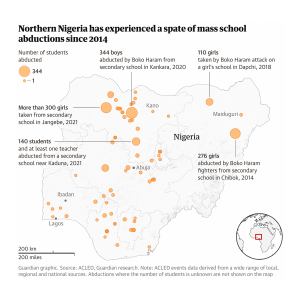Categories
On the 10-year mark of the Chibok abductions this week, as 90 girls remain in captivity, and the country recovers from another abduction of schoolchildren in Kaduna State in March of this year, I support the UNICEF action plan to secure children’s education in Nigeria, as the new report released states that just 37% of schools across 10 states have early warning systems in place to identify threats, such as school attacks, while calling for government accountability, and renewed commitment to rehabilitation efforts for survivors.

With child abductions becoming increasingly frequent in the last 10 years, with conflict-related violence leading to more than 1,680 children abducted while at school and else
where; 180 children killed due to attacks on schools; an estimated 60 school staff kidnapped and 14 killed; and more than 70 attacks on schools, according to verified reports by the United Nations, and given the alarming statistics in the ‘Minimum Standards for Safe Schools (MSSS) Monitoring Report,’ it is evident that our efforts to safeguard our children’s futures in Nigeria must be amplified, addressing not only the symptoms but also the root causes of this crisis.
Despite initial assurances, the ongoing captivity of some of the Chibok girls serves as a stark reminder of the need for greater accountability and action of political will to ensure all schools across all states have the resources and tools to fully implement the #MSSS, focusing on the most vulnerable regions to close the critical gaps in safe school infrastructure, strengthen law enforcement and security measures to protect educational institutions and communities from attacks and abductions, prioritise education and child protection in national policies and budget allocations to create a safer, more inclusive environment for all Nigerian children, and ensure the continuity of education and learning when schools are shut through multiple learning pathways such as digital platforms.
The lack of tangible domestic intelligence, knowledge sharing and learning, transparency and deterrent measures to effectively address the scourge of abductions, despite the Safe Schools Initiative, is deeply disheartening and underscores the urgent need for greater accountability and measurable justice. I will continue to insist that the establishment of a register of victims of forced disappearance is imperative at the global, regional, and national levels, for governments to fulfil their obligations under international law, uphold human rights standards, and demonstrate their commitment to combating impunity.
Furthermore, comprehensive rehabilitation must be at the forefront as we strive to support survivors in rebuilding their lives, including programs which address the physical, emotional, and psychological needs to ensure long-term recovery and wellbeing, alongside concrete steps to tackle the insecurity and militancy in the region.
Education is a fundamental right and a crucial pathway in achieving peace and prosperity, yet for too many Nigerian children, it remains unsafe and unattainable. As we analyse and assess the past 10 years, we must pledge to protect children and promote the recovery of those who suffer abuses, and call on the federal government, including the military, to ensure the prosecution of those who have overseen the widespread abduction, torture and murder of children and girls, while highlighting the need to invest more substantially in education and take concrete steps to reduce the barriers that deny many children access to school.
Categories